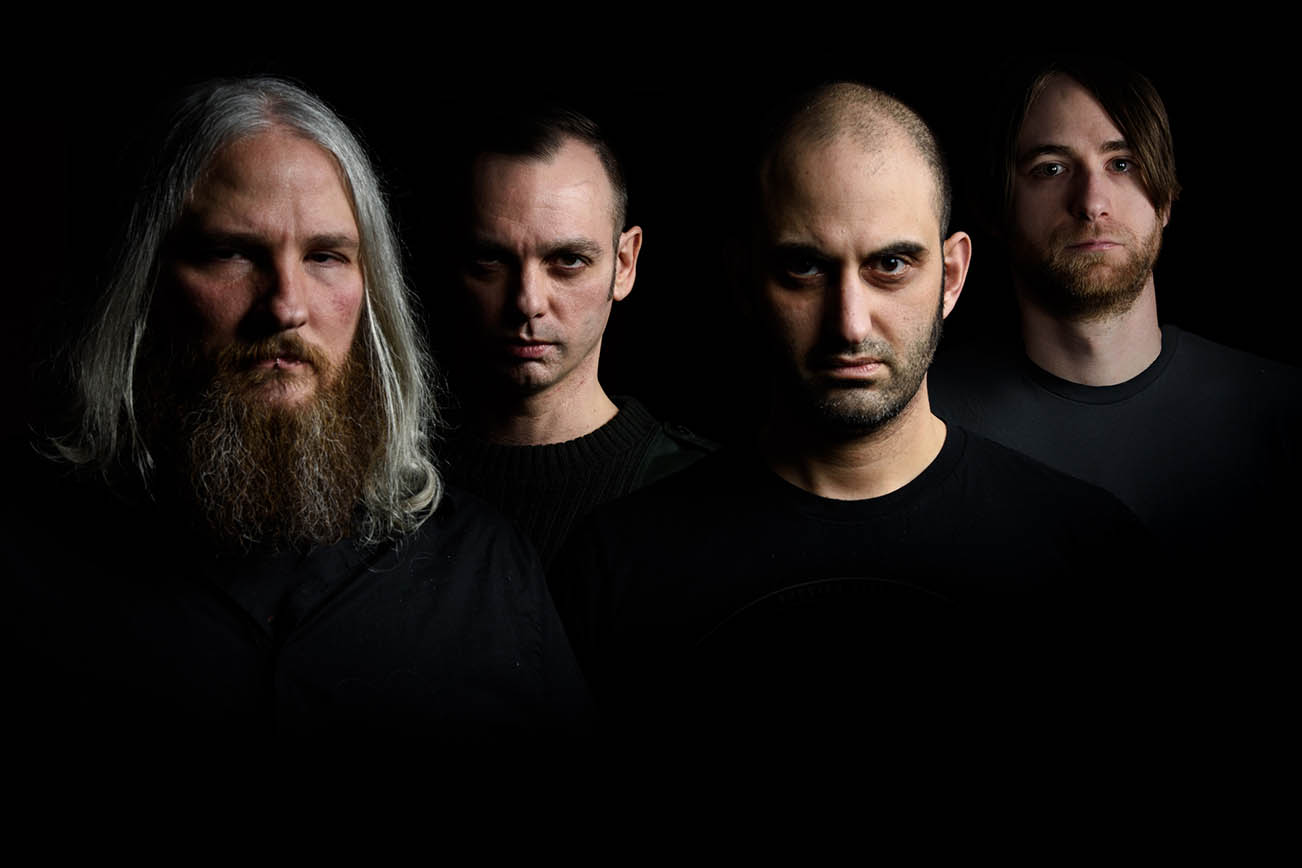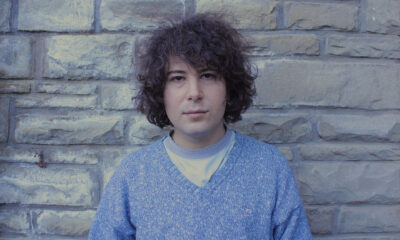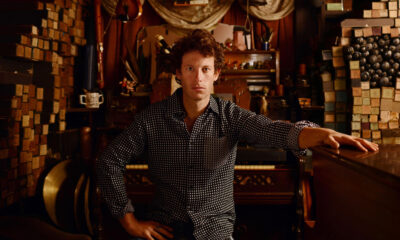Interviews
Loviatar Interview; Ottawa Doom Metal Group Discusses Prosthetic Records and Their New Self-Titled Album
Ottawa’s Loviatar issued their debut, self-titled album worldwide via Prosthetic Records and they chimed in on the music and more!

To some, Loviatar materialized out of nowhere and have likely made more than few green with envy considering that their debut, self-titled album is being issued worldwide by Prosthetic Records. To those members of Ottawa’s underground extreme music scene though, Loviatar aren’t at all spring chickens and this isn’t a case of overnight success. The post-doom metal quartet’s history goes back to 2010 and in the time before Loviatar, they have offered up four independently released EPs, most of which were recorded, produced and mastered by the band itself.
In fact, 2014’s Diva’s Hymn and Loviatar were both recorded themselves at a studio owned and operated by two of the band’s members. The group’s sound justifiably calls for the use of adjectives like expansive, sprawling, cinematic and epic as they drawn inspiration from the regal side of castle spire doom and studious, horn-rimmed post metal, integrating one into the other with a smooth seamlessness. With all that in mind, we figured corralling the band for a brief introductory light shining on their band (Loviatar, the moniker, is a Scandinavian death goddess, by the way) would make for some good reading.
Seeing as this is your reveal to the readers of PureGrainAudio, can you give a brief history of the band?
JP Sadek: Loviatar was initially born as a duo (myself and JD Gobeil). We were consciously trying to test the limits of our songwriting, as we felt confined by previous projects. “Blind Goddess of the Nine Plagues,” the B-side of this LP, was actually the first song we wrote, so it’s been around for almost eight years now. Our eyes may have been a bit bigger than our stomachs, as twenty minutes was just too much time for us to fill on our own. We got down to writing some more traditional doom material and got Mike [Bond] to come in on bass to round out the sound. When we recorded our third EP, Druid’s Curse, with Shane [Whitbread], it felt like we finally had all the pieces to our sonic puzzle. His atmospheric, ambient guitar style provided the perfect backdrop to our story telling and thematic exploration.
When putting Loviatar together, did you have a particular sonic goal or direction in mind? Were you looking to deliberately do something that stood apart from past projects/bands or did your sound just happen naturally?
JP Sadek: No band is without its influences, but the challenge is to move beyond them. To paraphrase Paul Chan, “there is a modern consensus that everything has been done, but this ignores the untapped potential of undoing before us.”
Mike Bond: To say that we have specific goals in mind for the outcome wouldn’t be entirely untrue, but really our sound came together and continues to evolve through the layering of each of our personalities.

What do you feel Loviatar provides for you that other bands you’ve been a member of haven’t?
JP Sadek: Time and space. Having our own workspace allows us to focus on our craft better and control our timelines.
Mike Bond: Freedom to experiment. Sonic exploration and unique ways of presenting songs are celebrated aspects of the band.
JP Sadek: An opportunity to explore storytelling and philosophical concepts that were too complicated for other styles, but lend themselves to the landscapes that we can craft now.
Shane Whitbread: The chance to incorporate elements from the ambient, drone and more abstract schools of music into song-based structures. The ability to work with people who understand that the studio is as much an instrument as it is a tool.
How long did it take to write the new album and what would you say were the major motivations that spurred you towards its creation?
JP Sadek: In a sense, this album is the band coming full circle, as “…Plagues” was the first song we wrote, and was always intended to be our first major work, even if it took the better part of a decade to refine and make public.
Mike Bond: We spent a lot of time refining the arrangements on this album, exactly how long I couldn’t say. As noted, “…Plagues” was the first piece we performed together when I joined the band eight years ago. It sat on the shelf for years after that because we weren’t sure what to do with such a massive song. When we were in the final stages of writing “Stygian…” last year, we realised how well our most recent work would compliment “…Plagues” and thought this album would be a perfect pairing.
JP Sadek: “Stygian Wyrm” (side A of Loviatar) was my first attempt at crafting a story from scratch specifically for a record. I wanted to follow a dragon from the moment of its birth (a horrible moment, drowning while surrounded by fire and lightning), and apply the corrupting effects of humanity to a timeless, ancient creature. He is a foil for humanity, in that his most important decisions are made out of weakness and fear. The lyrics to the song are verse passages that represent the biggest story shifts and main themes of the trilogy, but there is also a lot of accompanying prose that we hope to make public later on.
Check out a stream of the band’s new self-titled album Loviatar
Where was it recorded and how would you characterise the recording process? Did you find yourselves doing anything different or experiencing anything novel in the studio in trying to capture your particular sound or even there being a difference in process/technology compared to previous recording sessions?Mike Bond: We recorded our last two releases at Wolf Lake Studios, which is a custom-built recording facility in the woods of Quebec owned and operated by JP and myself. When we recorded Diva’s Hymn, the studio was in its final stages of construction, which made that a very different experience than we had with this album. When we started tracking this record the studio was complete, which really allowed us to focus on the music and getting the right tones for everything. We took more time with these sessions to develop and refine the material while recording, which is something that is much easier to do when you have the freedom of your own space.
Shane Whitbread: Time was the huge advantage. Not being on the clock and being free to experiment. It’s not that it was different than most of our sessions, just we had the chance to fully explore overdub ideas, play with parts, stack layers of different effects, and generally experiment more. The sense of urgency that you often feel in the studio was lessened.
At what point did Prosthetic come into the picture and is there a story behind their courting you and you signing with them?
Mike Bond: After we finished recording and mixing the album, we sent previews to a few labels that we felt might be interested in helping us release it. One of those labels really liked the material, and passed it on to the guys at Prosthetic, who shared their enthusiasm. We chose to work with Prosthetic because we connected with them personally, and they share our vision for Loviatar.
Do you have a plan on the table once the album is out?
JP Sadek: We are developing ideas for the live experience and are storyboarding the next record.
-

 Alternative/Rock1 day ago
Alternative/Rock1 day agoThe V13 Fix #010 w/ High on Fire, NOFX, My Dying Bride and more
-

 Hardcore/Punk1 week ago
Hardcore/Punk1 week agoHastings Beat Punks Kid Kapichi Vent Their Frustrations at Leeds Beckett University [Photos]
-

 Culture1 week ago
Culture1 week agoCirque Du Soleil OVO Takes Leeds Fans on a Unique, Unforgettable Journey [Photos]
-

 Alternative/Rock7 days ago
Alternative/Rock7 days agoA Rejuvenated Dream State are ‘Still Dreaming’ as They Bounce Into Manchester YES [Photos]
-

 Music2 days ago
Music2 days agoReclusive Producer Stumbleine Premieres Beat-Driven New Single “Cinderhaze”
-

 Culture3 days ago
Culture3 days agoDan Carter & George Miller Chat Foodinati Live, Heavy Metal Charities and Pre-Gig Meals
-

 Indie1 week ago
Indie1 week agoMichele Ducci Premieres Bouncy New Single “You Lay the Path by Walking on it”
-

 Alternative/Rock1 week ago
Alternative/Rock1 week agoWilliam Edward Thompson Premieres His Stripped-Down “Sleep Test” Music Video











